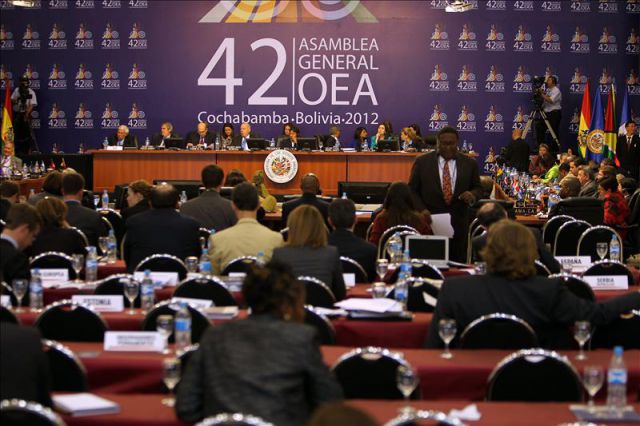






On June 3, 2012, at the 42nd OAS General Assembly in Cochabamba, Bolivia, as usually occurs, a dialogue meeting was held among the Heads of Delegations and the Secretary General and representatives of civil society, workers, the private sector, and other social actors. At that meeting, some social actors and members of the judiciary put forward their positions on the Inter-American System and human rights. Read the statement presented by Civil Society here. Watch the video of the meeting here (in Spanish).
The General Assembly opened with several speeches critical of the Inter-American System for the Protection of Human Rights by President Evo Morales of Bolivia and President Rafael Correa of Ecuador, followed by challenges raised by various representatives of the governments of the OAS.
On June 4, 2012, CEJIL and other members of the International Coalition of Human Rights Organizations in the Americas drafted a letter in support of the Inter-American System of Human Rights addressed to the region’s foreign ministers. After more than 400 signatures were obtained in 24 hours, the letter was also distributed to the various Heads of Delegations present in Cochabamba.
On the last day of the General Assembly, after several controversial remarks by some States, Resolution AG/RES.2761 (XLII-O/12), proposed by Mexico, was passed. On the basis of the Working Group’s report, this restrictive resolution entrusts the Permanent Council with the task of making proposals for the implementation of the Working Group’s recommendations, in dialogue with all parties involved. It further provides that those proposals will be submitted to an Special Session of the OAS General Assembly for consideration within six to nine months (during the first quarter of 2013).
This resolution contradicts what the States said in the Working Group’s report (Section VIII, Introduction point 4) of January, 2012, where they affirm their recognition of the autonomy and independence of the Inter-American Commission on Human Rights (IACHR). The resolution also contradicts numerous governments that stated that the IACHR should consider the suggestions of the members of the OAS, weighing which ones it would adopt and which ones it would not.
Therefore, this resolution is a step backward in the process of strengthening the system, in that it attempts to impose reforms upon the IACHR that only it canadopt autonomously because they are tied to its Rules of Procedure or practice. It is even more serious considering the fact that the conclusions the States arrived at were the result of discussions that were not very transparent or participatory. They did not include debates or the gathering of information and opinions from many sectors of the State or society in the region’s countries; nor were they the result of transparent and participatory debates at the regional level. Indeed, with this OAS General Assembly resolution the governments have attempted to impose changes to the IACHR’s work or its rules that weaken effectiveness, access, and, in the end, the ability to protect the rights of individuals in the hemisphere.
See what has been written about this in the press
After the General Assembly in Cochabamba, when the debate about the IAS was again taken up by the political bodies of the OAS, numerous civil society organizations expressed their concern over the lack of transparency in this new debate, and proposed practical measures for making the debate more participatory. See the July 11, 2012 letter from numerous civil society organizations to the former President of the Permanent Council of the OAS, Ambassador Diego Pary Rodríguez, requesting a more participatory debate.
¡Ayúdanos a continuar este trabajo crítico y urgente con una donación!
DONA AHORA